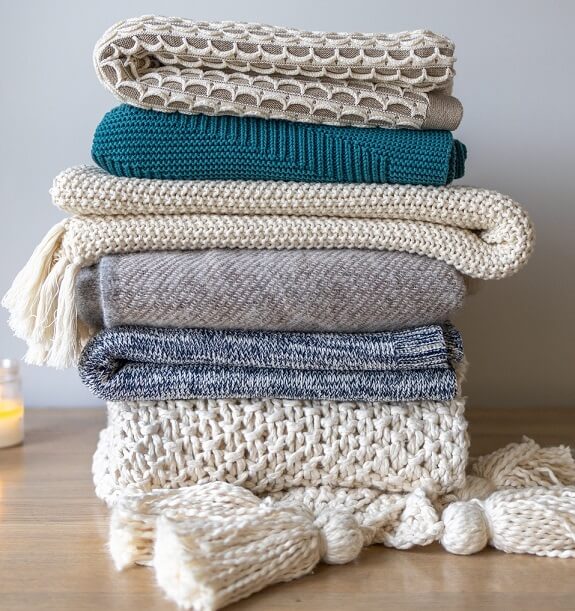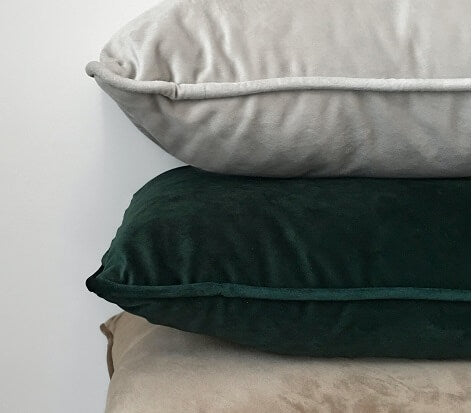
If you struggle with sleep, you’ve probably heard about the benefits of weighted blankets. These heavy blankets have become increasingly popular for their ability to improve sleep quality and reduce anxiety by mimicking the sensation of a cozy hug—a comforting, calming embrace. However, one of the biggest concerns people have when it comes to using a weighted blanket is whether or not they sleep hot. After all, no one wants to wake up sweating in the middle of the night. So, do weighted blankets sleep hot or not? Let’s dive into the pros and cons of using a weighted blanket and find out the answer to this burning question.
Introduction to Weighted Blankets
Weighted blankets have become a popular sleep accessory for people seeking a better night’s rest and relief from stress. These blankets are designed to provide gentle pressure across the body, mimicking the sensation of a comforting hug. This calming effect can help improve sleep quality and may even ease symptoms of anxiety and other mental health disorders. But are weighted blankets hot? That’s a common question, especially for those who tend to overheat at night. In this article, we’ll explore the pros and cons of weighted blankets, their benefits, and what you need to know to find the right one for your needs—so you can decide if a weighted blanket is the key to improving your sleep quality without making you too warm.
Understanding the Science Behind Weighted Blankets
Weighted blankets have gained popularity in recent years due to their ability to promote better sleep and reduce anxiety. But what is the science behind their effectiveness?
At their core, weighted blankets are designed to provide calming pressure and deep touch pressure (DTP) stimulation to the body. DTP, also known as deep pressure therapy, works by applying gentle pressure to the body, which helps release serotonin, a neurotransmitter responsible for regulating mood and promoting relaxation. Deep pressure therapy has been shown to promote relaxation and improve sleep quality through this targeted, therapeutic pressure. Additionally, DTP stimulates the release of oxytocin, another hormone that can help reduce stress and anxiety.
Weighted blankets also have an impact on the body’s autonomic nervous system, which controls our fight-or-flight response. The gentle pressure exerted by the blanket activates the parasympathetic nervous system, responsible for calming the body and inducing a state of relaxation. This shift from the sympathetic to the parasympathetic nervous system can help decrease heart rate and lower blood pressure, ultimately leading to better sleep. How the body responds to the calming effects of weighted blankets can vary, so it's important for users to observe their own reactions and adjust usage to find the most comfortable and suitable experience.
It’s important to note that not all weighted blankets are created equal. The weight of the blanket should be approximately 10% of your body weight to achieve optimal results. Additionally, the size and construction of the blanket can also affect its effectiveness. Ideally, the blanket should be evenly distributed to provide consistent pressure across the body.
Understanding the science behind weighted blankets can help us appreciate their benefits and make informed decisions when it comes to selecting the right one for our needs. In the following sections, we will explore how to use a weighted blanket effectively and delve deeper into the question of whether or not weighted blankets sleep hot, as well as examine the factors that influence their heat retention.
Do Weighted Blankets Really Sleep Hot?

Weighted blankets have gained a lot of popularity for their ability to improve sleep quality and reduce anxiety. However, one of the main concerns people have is whether or not they sleep hot. Nobody wants to wake up drenched in sweat in the middle of the night. Overheating can also lead to night sweats and discomfort, making it important to choose the right blanket for your needs. So, do weighted blankets really sleep hot?
The answer is not a simple yes or no. It actually depends on a few factors. Weighted blankets are designed to provide a comforting and snug feeling, which can be great during colder nights. The added weight can help promote a sense of security and relaxation, which can lead to better sleep. However, this added weight can also trap heat, especially if the blanket is made of materials that do not allow for proper airflow.
To determine whether or not a weighted blanket sleeps hot, it’s important to consider the construction and materials used. Certain fabrics can trap body heat, leading to extra heat and potentially more heat for hot sleepers. Blankets made of breathable fabrics like cotton or bamboo are less likely to retain heat. Additionally, some manufacturers have developed cooling weighted blankets that use cooling technology or incorporate cooling gel beads to help regulate body temperature.
It’s also crucial to consider your personal preferences and sensitivity to temperature. If you tend to sleep hot, you may want to opt for a lighter-weighted blanket or look for one specifically designed to keep you cool.
Ultimately, whether or not a weighted blanket sleeps hot is a subjective experience. Weighted blankets are good for some conditions, such as anxiety and restless leg syndrome, but may not be ideal for those prone to overheating. It’s essential to consider your own preferences and needs when selecting a weighted blanket to ensure a comfortable and restful night’s sleep.
Factors Influencing the Heat Retention in Weighted Blankets
When it comes to determining whether or not a weighted blanket sleeps hot, there are several factors that can influence heat retention. Let’s explore these factors and understand how they can impact your sleeping experience.
Firstly, the type of material used in the construction of the weighted blanket plays a significant role. The fill material—such as glass beads, plastic pellets, or micro glass beads—affects breathability and heat retention, with micro glass beads and glass beads often providing better airflow and temperature regulation compared to other fillers. Synthetic fabrics can increase heat retention, while natural, breathable fabrics like cotton or bamboo are less likely to trap heat. Choosing a breathable fabric for the outer fabric, such as bamboo wicks, can help with moisture-wicking and cooling. Breathable weighted blankets are a great solution for hot sleepers, as they use materials and designs that promote airflow. Knitted weighted blankets made from natural materials offer a breathable alternative due to their open-weave design. Duvet style blankets, which are traditional weighted blankets with removable covers, often use glass beads or plastic pellets as fill and are easy to maintain.
Secondly, the blanket weight can also affect heat retention. Heavier blankets tend to have more layers or thicker padding, which can result in more insulation and potential heat retention. If you tend to sleep hot, you may want to opt for a lighter blanket weight that provides the desired pressure without causing excessive warmth.
Additionally, the climate and temperature of your sleeping environment can influence heat retention. If you live in a warmer climate or tend to keep your bedroom at a higher temperature, you may be more prone to feeling hot with a weighted blanket. In contrast, cooler temperatures can help offset any potential heat retention from the blanket.
Lastly, personal preference and sensitivity to temperature play a crucial role. Some individuals naturally sleep hotter than others, and their perception of heat can vary. It’s important to consider your own body’s response to temperature and select a weighted blanket that suits your comfort level.
By taking into account the material, weight, climate, and personal preferences, you can find a weighted blanket that provides the desired pressure without causing excessive heat retention. Keep in mind that material costs can vary depending on the type of fill and fabric used, which may influence your choice. Experimentation may be necessary to find the perfect balance between comfort and temperature regulation.
Cooling Weighted Blankets
If you’re a hot sleeper but still want the soothing benefits of deep pressure stimulation, cooling weighted blankets might be the perfect solution. These blankets are specially designed to regulate temperature and keep you comfortable throughout the night. Cooling weighted blankets often use breathable fabrics like cotton or bamboo, which allow air to circulate and help wick away moisture. Some even feature advanced cooling technologies or phase-change materials that actively draw heat away from your body. For added convenience, many cooling weighted blankets come with a removable cover, making them easy to wash and maintain. When shopping for a cooling weighted blanket, look for lightweight designs and breathable materials to ensure you stay cool while enjoying the calming pressure that weighted blankets provide.
Weighted Blankets in Colder Climates
Weighted blankets aren’t just for those who want to stay cool—they can also be a cozy companion during chilly nights. In colder climates, using a weighted blanket can provide extra warmth and comfort that regular blankets might not offer. The added weight helps trap heat, making it easier to stay snug and comfortable even when temperatures drop. If you’re looking for maximum warmth, consider a weighted blanket made with thicker, insulating materials like fleece or wool, and opt for a heavier weight to enhance the cozy effect. Whether you’re curling up on the couch or settling in for a long winter’s night, a weighted blanket can help you stay warm and relaxed all season long.
Tips to Stay Cool While Using a Weighted Blanket
If you’re concerned about sleeping hot with a weighted blanket, there are some tips you can follow to help stay cool and comfortable throughout the night. Here are a few suggestions:
- Choose the right fabric: Opt for a weighted blanket made from breathable materials such as cotton or bamboo. These natural fibers allow for better airflow, helping to regulate your body temperature and prevent excessive heat retention.
- Use a cooling cover: Consider using weighted blanket covers made from cooling materials or with moisture-wicking properties. Weighted blanket covers not only make cleaning easier and add durability, but their design and fabric can also enhance temperature regulation and user comfort, keeping you cool and dry while still providing the comforting pressure of the weighted blanket.
- Dress lightly: Wear lightweight, breathable sleepwear or even sleep in your underwear to help regulate your body temperature. Avoid heavy or restrictive clothing that may contribute to feeling overheated.
- Keep your bedroom cool: Ensure your bedroom is kept at a comfortable temperature, aiming for the ideal sleep temperature between 65 and 68 degrees Fahrenheit for optimal rest. Use fans or air conditioning if necessary to create a cool sleep environment.
- Use a cooling pillow: Invest in a cooling pillow or use a pillowcase made from cooling fabrics to help regulate your body temperature from the head down.
By following these tips, you can enjoy the benefits of a weighted blanket while still staying cool and comfortable throughout the night. Remember, finding the right balance between pressure and temperature is essential for a restful and rejuvenating sleep experience. When you find weighted blankets that suit your needs, consider the materials, weight, and design to ensure both comfort and safety. Sweet dreams!
Safety Considerations
While weighted blankets offer many benefits, it’s important to use them safely. Weighted blankets are not recommended for children under 2 years old, as the extra weight can pose a suffocation risk. If you have sleep apnea, respiratory issues, or limited mobility, consult your healthcare provider before using a weighted blanket to ensure it’s safe for you. Always follow the recommended weight guidelines—typically about 10% of your body weight—to avoid discomfort or potential health risks. By choosing the right weighted blanket and using it properly, you can enjoy its calming benefits while keeping safety a top priority.
Evaluating the Pros and Cons of Weighted Blankets
Weighted blankets have become increasingly popular for their ability to improve sleep quality and reduce anxiety. Weighted blanket benefits include promoting relaxation, reducing stress, and supporting overall well-being. Weighted blanket pros also extend to improved mood and concentration. However, like any sleep product, they come with their own set of pros and cons. If you’re considering investing in one, it’s helpful to know how to choose a weighted blanket that best fits your needs by weighing these advantages and disadvantages.
One of the main pros of using a weighted blanket—sometimes called a heavy blanket—is the deep pressure stimulation it provides. The weighted blanket's soothing pressure can help promote relaxation, reduce anxiety, and improve sleep quality. This gentle, comforting pressure can help users fall asleep faster, stay asleep longer, and achieve deeper sleep, restful sleep, and peaceful sleep. Many people find that the blanket’s weight creates a sense of security, leading to a more restful night’s sleep and overall quality sleep. Most weighted blankets are designed to suit a variety of needs and preferences, making them suitable for different users. Additionally, the pressure may help with sleep disorders and anxiety symptoms by reducing restlessness and calming the body and mind.
Another advantage is the potential for pain relief. The weight can alleviate muscle tension and joint discomfort, making it especially helpful for individuals with conditions like arthritis or fibromyalgia.
However, there are some downsides to consider. Weighted blankets, particularly those made from less breathable materials, can trap heat, which may lead to discomfort for those who tend to sleep hot. Additionally, they can be more expensive than regular blankets, so cost is another factor to keep in mind.
In summary, while weighted blankets offer benefits like better sleep, reduced anxiety, and possible pain relief, they may feel too warm for some, and the cost can be a deterrent. Knowing these pros and cons can help you decide if a weighted blanket is right for you.
User Experiences and Reviews
Many people who use weighted blankets report significant improvements in their sleep quality, feeling more relaxed and less anxious at bedtime. Some users have found relief from chronic pain, while others with attention deficit hyperactivity disorder or autism spectrum disorder say that the gentle, consistent pressure helps them feel calmer and more secure. However, not all experiences are positive—some hot sleepers find that weighted blankets can feel too warm, especially if the materials aren’t breathable. That’s why it’s important to read reviews and consider your own needs when choosing a weighted blanket. By paying attention to factors like weight, fabric, and construction, you can find a weighted blanket that delivers the comfort and support you need for a restful night’s sleep.
FAQ
1. Are weighted blankets hot to sleep with?
Weighted blankets can be slightly warmer than standard blankets, but with breathable fabrics and cooling materials, they can still be comfortable for hot sleepers. If you've been searching for a way to enhance nighttime relaxation, chances are you've come across weighted blankets.
2. What are the negatives of weighted blankets?
Not Suitable for All. As sad as it might sound, not everyone can enjoy the benefits of a weighted blanket. You should avoid the use of a weighted blanket if you have conditions like asthma or sleep apnea. You might end up having difficulty breathing in your sleep due to their added pressure.
3. What happens if you sleep with a weighted blanket every night?
And, weighted blankets have proved to be beneficial. The extra pressure it gives to sleepers can assist them in better calming their breathing and heart rate. A more calm approach to sleeping results in a more peaceful night's sleep.






